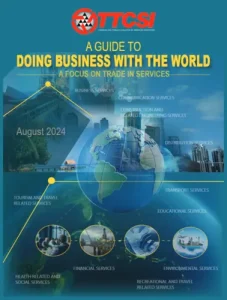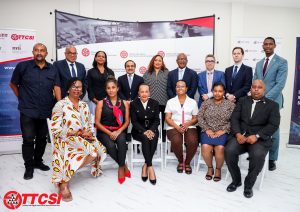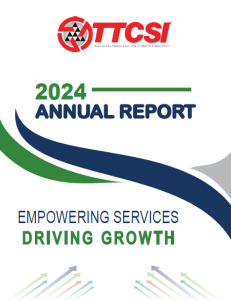FEATURE ADDRESS BY
THE HON. STEPHEN CADIZ
MINISTER OF TRADE & INDUSTRY
AT THE OPENING OF
NATIONAL SERVICES WEEK 2010
8:30 AM
MONDAY 25TH OCTOBER, 2010
CALYPSO LOUNGE
CROWNE PLAZA
WRIGHTSON ROAD
PORT OF SPAIN
§ H.E. Mervyn Assam, Ambassador Extraordinaire and Plenipotentiary for Trade and Industry
§ Members of the Diplomatic Corps
§ Permanent Secretaries and Other Government Officials
§ Mr. Thackwray Driver, Vice President, Trinidad and Tobago Coalition of Service Industries (TTCSI)
§ Mr. Nirad Tewarie, CEO, TTCSI
§ Board and Staff of the TTCSI
§ Representatives of the Business Community
§ Members of the Media
§ Ladies and Gentlemen.
Good Morning everyone. I am truly pleased to be here at the launch of National Services Week 2010. This year’s topic “Services Driving Development” is truly relevant in light of the current world economic climate and indeed in terms of our own objectives for long term economic growth. I commend the TTCSI for organizing this event for the third consecutive year. The annual services week has definitely increased awareness of the opportunities available within the services sector. As previously mentioned, the services sector is very close to my own heart.
Ladies and Gentlemen, services are the fastest growing component of international trade. At the beginning of the 21st century services accounted for approximately 20 percent of world trade, but by 2020, this figure is expected to rise to 50 percent, according to the International Trade Center (ITC).
Services make up a major segment of world economies, ranging from 89 percent of GDP in China to 45 percent in the Least Developed Countries (LDCs). Here in Trinidad and Tobago the services sector account for more than 55 percent of GDP and employs some 65 percent of the workforce.
Worldwide, there is a growing recognition of the pivotal role that services play in all economies in driving development. The digital revolution has also opened up new mechanisms to facilitate trade in services.
The Government of Trinidad and Tobago views our services sector as a key factor in the drive to diversify the economy, create jobs and enhance economic development. To this end, the Trinidad and Tobago Coalition of Services Industries (TTCSI) was established to encourage service sector growth and development. The mandate of the TTCSI is to assist service providers to identify and exploit market opportunities, develop capacity among local services providers, facilitate access into foreign markets and ensure that member interests are represented in trade negotiations.
MTI recently signed an MOU with the TTCSI designed to deepen long term coordination between MTI and the TTCSI to further agency’s objectives and the development of the overall Services Policy of the Trinidad and Tobago.
One of the TTCSI’s major projects – The ICT Innovation for the development of the Masquerade industry in T&T – will be launched later this week. In addition, we will also see the formation of a Printing and Packaging Association, designed to strengthen this key sector as it increases its export drive. Both these projects are supported by MTI and this confirms Government’s commitment to developing the services sector from a more comprehensive perspective, in light of its contribution to the diversification drive. Right now we are looking into the fashion and garment industry in Trinidad and Tobago. We need to be an exporter of costuming, music, etc. and take advantage of our experience in Carnival.
Ladies and gentlemen, the role of Government is to facilitate trade, to provide the enabling environment for business to function effectively and the regulatory framework to support trade, business and investment. We are not in the business of conducting business – that is for the private sector.
MTI is continuously engaged in developing policies and initiatives to facilitate trade and exports. As members of CARICOM, Trinidad and Tobago negotiated trade agreements with some of our Latin neighbours, and signed a new trade and economic agreement – the EPA – with our third largest trading partner – the European Union. We are also in the midst of trade negotiations with Canada and soon after Central America. The Canadian Trade Agreement is expected to be signed very soon as well.
One of the newest developments in trade agreements is the inclusion of services, as seen in the EPA and now under discussion in our pending agreement with Canada. This opens up new areas for ICT, the creative industries, tourism, professional services, energy services, maritime services, media, just to name a few. The critical step is for service providers to take greater advantage of these market opportunities. We have to increase understanding of what these trade agreements mean and we will be working with stakeholders and the different Chambers to ensure that members understand these agreements.
In late September MTI hosted a Business Forum in Shanghai, to leverage on the Trinidad and Tobago presence at Expo Shanghai 2010. Our focus happened to be on three critical service sectors – ICT, tourism and music and entertainment. Representatives from some 150 firms from Shanghai and nearby provinces gathered at the Sofitel Shanghai to hear the T&T story, especially the investment opportunities available in these three key service areas.
Since services have been identified as a major contributor to economic development MTI will, in consultation with stakeholders, develop a comprehensive strategic plan for the local services sector. This Policy will among other things seek to increase the capability of service providers to take advantage of export opportunities.
Apart from the TTCSI, MTI continues to work with its other agencies, such as the BDC and Eteck to promote the development of, and investment in the local services sector. For example, the Research and Development (R&D) Facility of the BDC targets business enterprises that would like to introduce innovation ideas into their business to improve competitiveness and profitability. The criteria for accessing the Facility will be expanded from $5 Million to $25 Million in sales. Additionally, the grant for single projects will be increased from $100,000 to $500,000 and for alliance projects from $200,000 to $1 million. In Singapore, the government made an R&D grant for 10bn Singapore dollars and although we will not as yet be able to make that kind of commitment, we are trying to develop R&D in T&T.
The BDC also offers business owners access to its trade portal where they can register on-line, create important business linkages, access new clients and market their services.
As most of you would know, through the implementation of the Single Electronic window (SEW), MTI is working to enhance the business environment to make us more competitive. While the SEW is designed to facilitate easier, swifter trade in goods/merchandise, this IT-platform is essentially a service activity.
The SEW is an innovative trade-facilitation tool which allows users and government agencies to conduct trade related transactions online using a single e-document. The Ministry has partnered with CrimsonLogic of Singapore to establish the SEW and once fully operational, it will help to speed up business and trade processes, and ultimately improve our level of competitiveness. This is obviously something that has to happen in T&T.
It should be noted that the implementation of the SEW involves more than just the introduction of a new technology solution for trade and business facilitation. It also impacts on one of the major service providers within the economy – Government. SEW will transform how government services are administered, i.e. business process re-engineering. Service standards will be redefined for each relevant government department to ensure a customer centric work flow. What has to happen is that we need to bring the cost of doing business in T&T down and we need to explore e-payment options.
The service sector is wide and varied and touches every aspect of economic life. At MTI, we are open to input from all sectors of the community to examine a range of service trade possibilities. We are here to facilitate business, while business owners are the ones who accept the risk to invest and engage in productive industrial activity. At the end of the day, all of the Government’s initiatives will come to naught unless the business community takes full advantage of it. We are also talking about back room support in services.
Ladies and Gentlemen while there may be challenges, we have a strong base of world class service providers on which to build and grow and in particular, to expand beyond the region into the global marketplace. While CARICOM is one of our most valuable markets, we must increase our engagement with the wider world. We also need to examine how T&T can capitalize on the additional trading with the widening of the Panama Canal.
In closing, I encourage participants here today to make full use of the information presented at the workshops during the course of this week. The information being presented is wide ranging, from intellectual property issues to investment strategies, and demonstrates the complexity and depth of service industries. On my recent trip to London the issue of Intellectual Property rights came up and we need a certain level of IP security rights here. We should also look into further tightening our IP security rights. Ladies and Gentlemen I wish to declare National Services Week 2010 officially open! I thank you.





